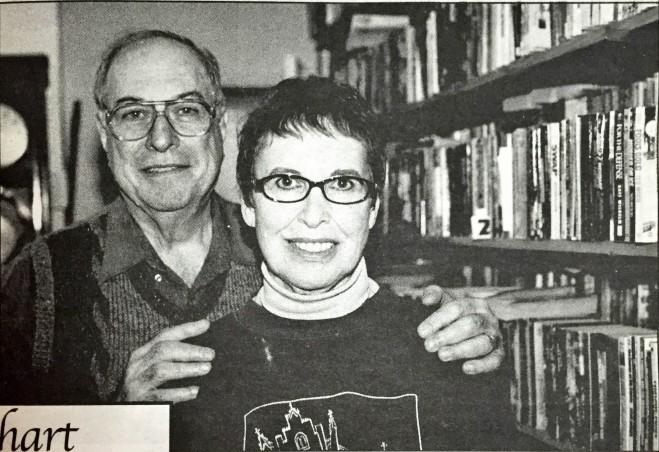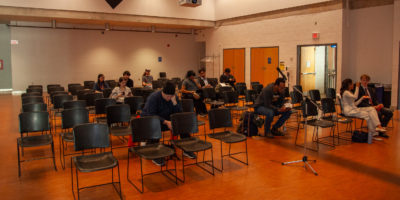For Ryerson’s most senior students, retirement is a time of learning about the world and giving back to future generations.
By Allan Woods
He jumped from a job as a waiter to the civil service to running his own psychotherapy practice.
He moved from Germany to England to Toronto.
Now, at the tender age of 76, Eugene Strauss is both student and educator, bringing his experiences, knowledge and learning to seniors like himself.
Now, Strauss is a creative writing facilitator, computer instructor and current events teacher at the LIFE institute, Ryerson’s rapidly growing seniors’ educating program.
“I was there when it was founded,” Strauss says of the program’s beginning 12 years ago. “We started small. The concept of third age learning and lifelong learning wasn’t as developed at that time.”
Strauss’ case is unique. Not many people return to school at the age of 60 — after 24-year career — to finish a masters degree and embark on a second career in psychotherapy. But more and more seniors are beginning to realize that life doesn’t end at 55, 65 or even 95.
The idea of heading back to school after retirement is gaining ground as the population leaves the workforce at a younger age and medical developments allow seniors to live longer, better lives.
And many universities like Ryerson are providing the space, as well as the instructor and tools, for seniors to achieve that goal.
At Ryerson, seniors’ education classes began about 20 years ago in much more primitive form, says program director Sandra Kerr.
“I think it began with a memoir-writing group,” she says of the original course, now known as Recording Recollections.
The program really grew when, in 1990, the LIFE institute (which stands for Learning is Forever) was born.
Fran Smookler, 68, learned about the program 12 years ago after she noticed an advertisement in a newspaper inviting retired or soon-to-be retired seniors to come to an information meeting.
“I was working at the time,” says the former lawyer. “When I retired I didn’t know what I’d be doing with my time.”
She wasn’t to be idle long, though. After her first class, which was held at the instructors home, she approached an organizer, mentioned that she was a lawyer and asked if there was any way she could help. That night, Smookler was given a position on LIFE institute’s board and she remains there 12 years later.
Classes began with about 75 students but have expanded each year, offering more and more courses in a variety of topics.
Enrolment peaked last year at a little over 500 “so-called students” as one current board member referred to the seniors.
On top of that number, Kerr says there are about 100 people taking acting classes with ACT II, a drama program aimed at seniors, as well as 80 volunteers who help with administrative work.
“We have close to 800 seniors who come on to campus each day,” says Kerr, who describes her job as a liaison between the LIFE institute and Ryerson. “They have their own offices and they determine the direction and kinds of activities they want to get involved in.”
The courses rely heavily on the experiences and expertise of the students, who are urged to come up with suggestions for courses they’d like to see offered.
A curriculum committee comprised of anywhere between six and a dozen people then develop the course and find instructors.
“We get ideas from people who say, ‘Why don’t you do this?’” says Marilyn Grace Holyer, the board’s president. “But there are a lot of students who bring up an idea for a course and don’t want to teach it. They just want to be happy in the audience.”
Peer-led courses, which are run by a LIFE institute volunteer, cost only $15 to join. Instructor-led courses, which are taught by specialists, cost students $35. Instructors are paid a small honorarium.
“Everybody is urged to teach who can, as well as to be a moderator and a leader,” Grace Holyer says.
Fran Smookler’s husband, Ken, is a fine example. A former lawyer, Smookler began leading courses on law and ethics, and the ethics of war, a course he developed after a conversation with his wife, that looks at the justification of a war from the opposing sides.
“I had more time to myself when I was practising law,” he jokes.
In addition to teaching and attending classes, Smookler also runs Travelearn, one of five clubs that developed out of LIFE institute classes.
The idea for a travel course, and the resulting club, began in 1999 after a group of seniors from China visited Ryerson.
“After (the visit), I said, ‘Wouldn’t it be nice if we planned a trip to China,’” Kerr recalls. “Next thing we knew, we had a group of interested seniors.” Once they chose the destination, LIFE’s curriculum committee developed a course to teach students about China’s culture, history and politics.
“If you take the trip, you have to take the courses,” Kerr says.
Smookler insists that, whatever destination they chose, the students must be able to take courses at a local university or college. “We are called a travel learn club,” he says.
Students take lectures in the mornings and experience the local sights and fare in the afternoons and evenings. And thanks to one student who works as a travel agent, they are able to get cheap package deals.
Since the China trip, classes have toured Turkey and Eastern Europe. This year, they will travel to Tuscany and Provence in Italy and France.
“It’s a big world out there and there’s a lot to explore and a lot to learn,” he says.
While the yearly gallivant must seem like a great way to spend one’s golden years, the seniors are also giving back to future generations.
Strauss realized the importance of this a lifetime ago in Nazi Germany. In 1939, he inherited a collection of memoirs his parents had collected for he and his older siblings. Among that collection was a journal recording the events in the life of his grandfather. The earliest date recorded in that book was 1856.
As Strauss began translating the priceless artifacts into English, coming across such events as the sinking of the Titanic in 1912, he says he became fascinated with his family’s history and its stories.
“As a result, I was encouraged to write my own story, which I’ve done in 440 pages,” he says. When working with an on-line memoir-writing group, he helps others seniors do the same by offering advice to stimulate their memories and suggesting writing styles in the hope that they too can pass on a part of their lives and experiences.
“I want people to write memoirs for their kids and grandchildren, but they don’t have to win a Pulitzer Prize,” he says.
Seniors chart their own course
Seniors taking courses with the LIFE institute have the flexibility to study courses they’re interested in or suggest courses on topics they want to learn about. Here is a selection of those classes from the upcoming winter course calendar:
Politics and the people: The longest-running and most popular course allows seniors to examine and debate issues and events in the news.
Recording recollections: Students meet weekly to share their written memories of “The good old days.”
Travelearn Tuscany and provence: Participants study art, history and Tuscan and Provencal food and wine in preparation for a class trip to Europe.
Genealogy: Billed as a course for those who have decided it’s time to research and record their family history. Seniors learn how to collect information, use the internet and interpret census records.










Leave a Reply